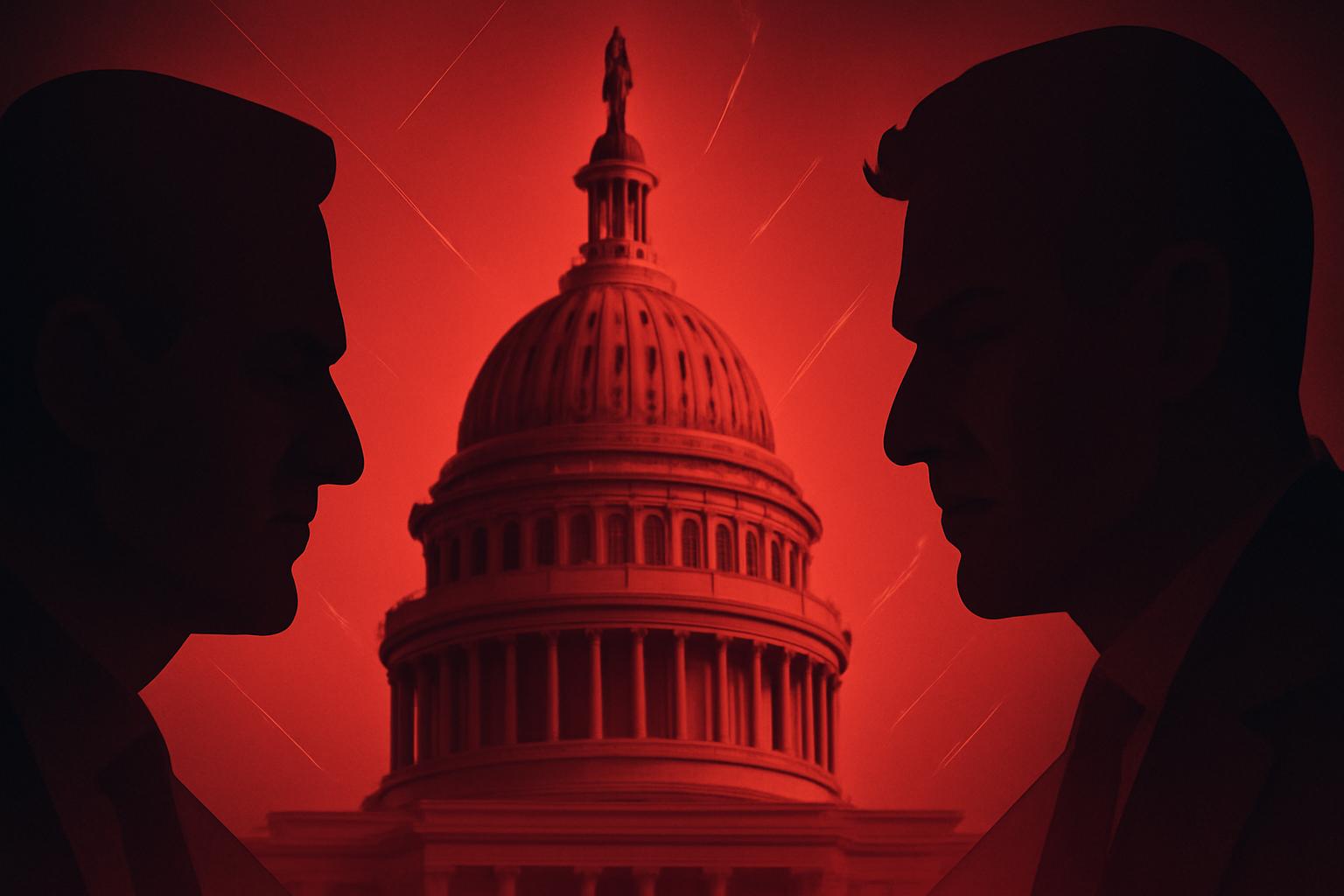The impending government shutdown exposes deep partisan divides over healthcare funding and budget priorities. Democrats’ firm stance on preserving ACA subsidies underscores the political sensitivity of healthcare costs ahead of the 2026 midterms, while Republicans’ insistence on a clean funding bill reflects strategic caution to avoid policy controversies in short-term spending measures. !-- wp:paragraph -->
Contents
FinOracleAI — Market ViewFinOracleAI — Market ViewSenate Dynamics May Determine OutcomeFinOracleAI — Market ViewSenate Dynamics May Determine OutcomeFinOracleAI — Market ViewEscalating Political Tensions and Cancelled MeetingsSenate Dynamics May Determine OutcomeFinOracleAI — Market ViewEscalating Political Tensions and Cancelled MeetingsSenate Dynamics May Determine OutcomeFinOracleAI — Market ViewRepublicans Reject Policy Riders, Seek Clean Funding BillEscalating Political Tensions and Cancelled MeetingsSenate Dynamics May Determine OutcomeFinOracleAI — Market ViewRepublicans Reject Policy Riders, Seek Clean Funding BillEscalating Political Tensions and Cancelled MeetingsSenate Dynamics May Determine OutcomeFinOracleAI — Market ViewDemocratic Leaders Demand Ironclad Healthcare ProtectionsRepublicans Reject Policy Riders, Seek Clean Funding BillEscalating Political Tensions and Cancelled MeetingsSenate Dynamics May Determine OutcomeFinOracleAI — Market ViewDemocratic Leaders Demand Ironclad Healthcare ProtectionsRepublicans Reject Policy Riders, Seek Clean Funding BillEscalating Political Tensions and Cancelled MeetingsSenate Dynamics May Determine OutcomeFinOracleAI — Market ViewGovernment Shutdown Deadline Intensifies Budget BattleDemocratic Leaders Demand Ironclad Healthcare ProtectionsRepublicans Reject Policy Riders, Seek Clean Funding BillEscalating Political Tensions and Cancelled MeetingsSenate Dynamics May Determine OutcomeFinOracleAI — Market View
- Opportunities: Bipartisan compromise could stabilize markets and reassure consumers by preserving ACA subsidies and preventing service disruptions.
- Risks: A shutdown risks disrupting federal services, exacerbating political polarization, and triggering premium spikes for millions.
- Potential fractures within Senate Democrats could influence the final outcome, with pragmatic members prioritizing government continuity over policy demands.
- Heightened political brinkmanship may erode investor confidence and increase volatility in healthcare and government-related sectors.
FinOracleAI — Market View
The impending government shutdown exposes deep partisan divides over healthcare funding and budget priorities. Democrats’ firm stance on preserving ACA subsidies underscores the political sensitivity of healthcare costs ahead of the 2026 midterms, while Republicans’ insistence on a clean funding bill reflects strategic caution to avoid policy controversies in short-term spending measures. !-- wp:paragraph -->- Opportunities: Bipartisan compromise could stabilize markets and reassure consumers by preserving ACA subsidies and preventing service disruptions.
- Risks: A shutdown risks disrupting federal services, exacerbating political polarization, and triggering premium spikes for millions.
- Potential fractures within Senate Democrats could influence the final outcome, with pragmatic members prioritizing government continuity over policy demands.
- Heightened political brinkmanship may erode investor confidence and increase volatility in healthcare and government-related sectors.
FinOracleAI — Market View
The impending government shutdown exposes deep partisan divides over healthcare funding and budget priorities. Democrats’ firm stance on preserving ACA subsidies underscores the political sensitivity of healthcare costs ahead of the 2026 midterms, while Republicans’ insistence on a clean funding bill reflects strategic caution to avoid policy controversies in short-term spending measures. !-- wp:paragraph -->- Opportunities: Bipartisan compromise could stabilize markets and reassure consumers by preserving ACA subsidies and preventing service disruptions.
- Risks: A shutdown risks disrupting federal services, exacerbating political polarization, and triggering premium spikes for millions.
- Potential fractures within Senate Democrats could influence the final outcome, with pragmatic members prioritizing government continuity over policy demands.
- Heightened political brinkmanship may erode investor confidence and increase volatility in healthcare and government-related sectors.
Senate Dynamics May Determine Outcome
The passage of any funding bill hinges on whether Senate Democrats will break ranks to join Republicans. Earlier this year, several Democrats, including Schumer, voted with Republicans to avoid a shutdown, a move that drew criticism from progressive factions. !-- wp:paragraph --> Currently, some Democratic senators, such as John Fetterman (Pa.), oppose the shutdown strategy, complicating the party’s unified stance. !-- wp:paragraph -->FinOracleAI — Market View
The impending government shutdown exposes deep partisan divides over healthcare funding and budget priorities. Democrats’ firm stance on preserving ACA subsidies underscores the political sensitivity of healthcare costs ahead of the 2026 midterms, while Republicans’ insistence on a clean funding bill reflects strategic caution to avoid policy controversies in short-term spending measures. !-- wp:paragraph -->- Opportunities: Bipartisan compromise could stabilize markets and reassure consumers by preserving ACA subsidies and preventing service disruptions.
- Risks: A shutdown risks disrupting federal services, exacerbating political polarization, and triggering premium spikes for millions.
- Potential fractures within Senate Democrats could influence the final outcome, with pragmatic members prioritizing government continuity over policy demands.
- Heightened political brinkmanship may erode investor confidence and increase volatility in healthcare and government-related sectors.
“Donald Trump wakes up Tuesday morning and goes on an unhinged rant and cancels the meeting,” Jeffries responded. “Why? Because he doesn’t want to discuss the Republican healthcare crisis, and they’ve decided to shut the government down.” Meanwhile, Schumer highlighted the stakes for millions of Americans facing sharp premium increases, stating, “Democrats are fighting to lower prices, while Republicans are failing families.”
!-- wp:paragraph -->Senate Dynamics May Determine Outcome
The passage of any funding bill hinges on whether Senate Democrats will break ranks to join Republicans. Earlier this year, several Democrats, including Schumer, voted with Republicans to avoid a shutdown, a move that drew criticism from progressive factions. !-- wp:paragraph --> Currently, some Democratic senators, such as John Fetterman (Pa.), oppose the shutdown strategy, complicating the party’s unified stance. !-- wp:paragraph -->FinOracleAI — Market View
The impending government shutdown exposes deep partisan divides over healthcare funding and budget priorities. Democrats’ firm stance on preserving ACA subsidies underscores the political sensitivity of healthcare costs ahead of the 2026 midterms, while Republicans’ insistence on a clean funding bill reflects strategic caution to avoid policy controversies in short-term spending measures. !-- wp:paragraph -->- Opportunities: Bipartisan compromise could stabilize markets and reassure consumers by preserving ACA subsidies and preventing service disruptions.
- Risks: A shutdown risks disrupting federal services, exacerbating political polarization, and triggering premium spikes for millions.
- Potential fractures within Senate Democrats could influence the final outcome, with pragmatic members prioritizing government continuity over policy demands.
- Heightened political brinkmanship may erode investor confidence and increase volatility in healthcare and government-related sectors.
Escalating Political Tensions and Cancelled Meetings
Tensions heightened after President Donald Trump canceled a planned meeting with top Democratic leaders, including Jeffries and Senate Minority Leader Chuck Schumer, citing a lack of productivity. !-- wp:paragraph -->“Donald Trump wakes up Tuesday morning and goes on an unhinged rant and cancels the meeting,” Jeffries responded. “Why? Because he doesn’t want to discuss the Republican healthcare crisis, and they’ve decided to shut the government down.” Meanwhile, Schumer highlighted the stakes for millions of Americans facing sharp premium increases, stating, “Democrats are fighting to lower prices, while Republicans are failing families.”
!-- wp:paragraph -->Senate Dynamics May Determine Outcome
The passage of any funding bill hinges on whether Senate Democrats will break ranks to join Republicans. Earlier this year, several Democrats, including Schumer, voted with Republicans to avoid a shutdown, a move that drew criticism from progressive factions. !-- wp:paragraph --> Currently, some Democratic senators, such as John Fetterman (Pa.), oppose the shutdown strategy, complicating the party’s unified stance. !-- wp:paragraph -->FinOracleAI — Market View
The impending government shutdown exposes deep partisan divides over healthcare funding and budget priorities. Democrats’ firm stance on preserving ACA subsidies underscores the political sensitivity of healthcare costs ahead of the 2026 midterms, while Republicans’ insistence on a clean funding bill reflects strategic caution to avoid policy controversies in short-term spending measures. !-- wp:paragraph -->- Opportunities: Bipartisan compromise could stabilize markets and reassure consumers by preserving ACA subsidies and preventing service disruptions.
- Risks: A shutdown risks disrupting federal services, exacerbating political polarization, and triggering premium spikes for millions.
- Potential fractures within Senate Democrats could influence the final outcome, with pragmatic members prioritizing government continuity over policy demands.
- Heightened political brinkmanship may erode investor confidence and increase volatility in healthcare and government-related sectors.
Escalating Political Tensions and Cancelled Meetings
Tensions heightened after President Donald Trump canceled a planned meeting with top Democratic leaders, including Jeffries and Senate Minority Leader Chuck Schumer, citing a lack of productivity. !-- wp:paragraph -->“Donald Trump wakes up Tuesday morning and goes on an unhinged rant and cancels the meeting,” Jeffries responded. “Why? Because he doesn’t want to discuss the Republican healthcare crisis, and they’ve decided to shut the government down.” Meanwhile, Schumer highlighted the stakes for millions of Americans facing sharp premium increases, stating, “Democrats are fighting to lower prices, while Republicans are failing families.”
!-- wp:paragraph -->Senate Dynamics May Determine Outcome
The passage of any funding bill hinges on whether Senate Democrats will break ranks to join Republicans. Earlier this year, several Democrats, including Schumer, voted with Republicans to avoid a shutdown, a move that drew criticism from progressive factions. !-- wp:paragraph --> Currently, some Democratic senators, such as John Fetterman (Pa.), oppose the shutdown strategy, complicating the party’s unified stance. !-- wp:paragraph -->FinOracleAI — Market View
The impending government shutdown exposes deep partisan divides over healthcare funding and budget priorities. Democrats’ firm stance on preserving ACA subsidies underscores the political sensitivity of healthcare costs ahead of the 2026 midterms, while Republicans’ insistence on a clean funding bill reflects strategic caution to avoid policy controversies in short-term spending measures. !-- wp:paragraph -->- Opportunities: Bipartisan compromise could stabilize markets and reassure consumers by preserving ACA subsidies and preventing service disruptions.
- Risks: A shutdown risks disrupting federal services, exacerbating political polarization, and triggering premium spikes for millions.
- Potential fractures within Senate Democrats could influence the final outcome, with pragmatic members prioritizing government continuity over policy demands.
- Heightened political brinkmanship may erode investor confidence and increase volatility in healthcare and government-related sectors.
Republicans Reject Policy Riders, Seek Clean Funding Bill
Republican leaders remain steadfast against including healthcare provisions in the stopgap funding measure. Senate Majority Leader John Thune (R-S.D.) described Democrats’ demands as “unreasonable and unserious,” while House Speaker Mike Johnson (R-La.) framed the ACA subsidy extension as a policy issue for December, not September. !-- wp:paragraph --> The GOP insists on passing a clean continuing resolution, arguing that attaching policy riders jeopardizes the narrow Senate majority’s ability to secure the necessary 60 votes to keep the government open. !-- wp:paragraph -->Escalating Political Tensions and Cancelled Meetings
Tensions heightened after President Donald Trump canceled a planned meeting with top Democratic leaders, including Jeffries and Senate Minority Leader Chuck Schumer, citing a lack of productivity. !-- wp:paragraph -->“Donald Trump wakes up Tuesday morning and goes on an unhinged rant and cancels the meeting,” Jeffries responded. “Why? Because he doesn’t want to discuss the Republican healthcare crisis, and they’ve decided to shut the government down.” Meanwhile, Schumer highlighted the stakes for millions of Americans facing sharp premium increases, stating, “Democrats are fighting to lower prices, while Republicans are failing families.”
!-- wp:paragraph -->Senate Dynamics May Determine Outcome
The passage of any funding bill hinges on whether Senate Democrats will break ranks to join Republicans. Earlier this year, several Democrats, including Schumer, voted with Republicans to avoid a shutdown, a move that drew criticism from progressive factions. !-- wp:paragraph --> Currently, some Democratic senators, such as John Fetterman (Pa.), oppose the shutdown strategy, complicating the party’s unified stance. !-- wp:paragraph -->FinOracleAI — Market View
The impending government shutdown exposes deep partisan divides over healthcare funding and budget priorities. Democrats’ firm stance on preserving ACA subsidies underscores the political sensitivity of healthcare costs ahead of the 2026 midterms, while Republicans’ insistence on a clean funding bill reflects strategic caution to avoid policy controversies in short-term spending measures. !-- wp:paragraph -->- Opportunities: Bipartisan compromise could stabilize markets and reassure consumers by preserving ACA subsidies and preventing service disruptions.
- Risks: A shutdown risks disrupting federal services, exacerbating political polarization, and triggering premium spikes for millions.
- Potential fractures within Senate Democrats could influence the final outcome, with pragmatic members prioritizing government continuity over policy demands.
- Heightened political brinkmanship may erode investor confidence and increase volatility in healthcare and government-related sectors.
“We have to have a conversation with Republicans in order to work toward decisively resolving the health care crisis that they’ve created,” Jeffries said. “And part of that health care crisis relates to the Republican refusal to extend the Affordable Care Act tax credits.” These tax credits play a critical role in lowering insurance premiums for millions who purchase coverage through Obamacare marketplaces. According to the Kaiser Family Foundation, losing these credits could trigger an average premium increase of roughly 75% starting November 1.
!-- wp:paragraph -->Republicans Reject Policy Riders, Seek Clean Funding Bill
Republican leaders remain steadfast against including healthcare provisions in the stopgap funding measure. Senate Majority Leader John Thune (R-S.D.) described Democrats’ demands as “unreasonable and unserious,” while House Speaker Mike Johnson (R-La.) framed the ACA subsidy extension as a policy issue for December, not September. !-- wp:paragraph --> The GOP insists on passing a clean continuing resolution, arguing that attaching policy riders jeopardizes the narrow Senate majority’s ability to secure the necessary 60 votes to keep the government open. !-- wp:paragraph -->Escalating Political Tensions and Cancelled Meetings
Tensions heightened after President Donald Trump canceled a planned meeting with top Democratic leaders, including Jeffries and Senate Minority Leader Chuck Schumer, citing a lack of productivity. !-- wp:paragraph -->“Donald Trump wakes up Tuesday morning and goes on an unhinged rant and cancels the meeting,” Jeffries responded. “Why? Because he doesn’t want to discuss the Republican healthcare crisis, and they’ve decided to shut the government down.” Meanwhile, Schumer highlighted the stakes for millions of Americans facing sharp premium increases, stating, “Democrats are fighting to lower prices, while Republicans are failing families.”
!-- wp:paragraph -->Senate Dynamics May Determine Outcome
The passage of any funding bill hinges on whether Senate Democrats will break ranks to join Republicans. Earlier this year, several Democrats, including Schumer, voted with Republicans to avoid a shutdown, a move that drew criticism from progressive factions. !-- wp:paragraph --> Currently, some Democratic senators, such as John Fetterman (Pa.), oppose the shutdown strategy, complicating the party’s unified stance. !-- wp:paragraph -->FinOracleAI — Market View
The impending government shutdown exposes deep partisan divides over healthcare funding and budget priorities. Democrats’ firm stance on preserving ACA subsidies underscores the political sensitivity of healthcare costs ahead of the 2026 midterms, while Republicans’ insistence on a clean funding bill reflects strategic caution to avoid policy controversies in short-term spending measures. !-- wp:paragraph -->- Opportunities: Bipartisan compromise could stabilize markets and reassure consumers by preserving ACA subsidies and preventing service disruptions.
- Risks: A shutdown risks disrupting federal services, exacerbating political polarization, and triggering premium spikes for millions.
- Potential fractures within Senate Democrats could influence the final outcome, with pragmatic members prioritizing government continuity over policy demands.
- Heightened political brinkmanship may erode investor confidence and increase volatility in healthcare and government-related sectors.
Democratic Leaders Demand Ironclad Healthcare Protections
House Minority Leader Hakeem Jeffries (D-N.Y.) emphasized the necessity of including ACA subsidy extensions in budget negotiations. At a recent press conference, Jeffries warned that any agreement “has to be ironclad and in legislation,” citing deep mistrust toward Republicans’ past attempts to undermine bipartisan accords. !-- wp:paragraph -->“We have to have a conversation with Republicans in order to work toward decisively resolving the health care crisis that they’ve created,” Jeffries said. “And part of that health care crisis relates to the Republican refusal to extend the Affordable Care Act tax credits.” These tax credits play a critical role in lowering insurance premiums for millions who purchase coverage through Obamacare marketplaces. According to the Kaiser Family Foundation, losing these credits could trigger an average premium increase of roughly 75% starting November 1.
!-- wp:paragraph -->Republicans Reject Policy Riders, Seek Clean Funding Bill
Republican leaders remain steadfast against including healthcare provisions in the stopgap funding measure. Senate Majority Leader John Thune (R-S.D.) described Democrats’ demands as “unreasonable and unserious,” while House Speaker Mike Johnson (R-La.) framed the ACA subsidy extension as a policy issue for December, not September. !-- wp:paragraph --> The GOP insists on passing a clean continuing resolution, arguing that attaching policy riders jeopardizes the narrow Senate majority’s ability to secure the necessary 60 votes to keep the government open. !-- wp:paragraph -->Escalating Political Tensions and Cancelled Meetings
Tensions heightened after President Donald Trump canceled a planned meeting with top Democratic leaders, including Jeffries and Senate Minority Leader Chuck Schumer, citing a lack of productivity. !-- wp:paragraph -->“Donald Trump wakes up Tuesday morning and goes on an unhinged rant and cancels the meeting,” Jeffries responded. “Why? Because he doesn’t want to discuss the Republican healthcare crisis, and they’ve decided to shut the government down.” Meanwhile, Schumer highlighted the stakes for millions of Americans facing sharp premium increases, stating, “Democrats are fighting to lower prices, while Republicans are failing families.”
!-- wp:paragraph -->Senate Dynamics May Determine Outcome
The passage of any funding bill hinges on whether Senate Democrats will break ranks to join Republicans. Earlier this year, several Democrats, including Schumer, voted with Republicans to avoid a shutdown, a move that drew criticism from progressive factions. !-- wp:paragraph --> Currently, some Democratic senators, such as John Fetterman (Pa.), oppose the shutdown strategy, complicating the party’s unified stance. !-- wp:paragraph -->FinOracleAI — Market View
The impending government shutdown exposes deep partisan divides over healthcare funding and budget priorities. Democrats’ firm stance on preserving ACA subsidies underscores the political sensitivity of healthcare costs ahead of the 2026 midterms, while Republicans’ insistence on a clean funding bill reflects strategic caution to avoid policy controversies in short-term spending measures. !-- wp:paragraph -->- Opportunities: Bipartisan compromise could stabilize markets and reassure consumers by preserving ACA subsidies and preventing service disruptions.
- Risks: A shutdown risks disrupting federal services, exacerbating political polarization, and triggering premium spikes for millions.
- Potential fractures within Senate Democrats could influence the final outcome, with pragmatic members prioritizing government continuity over policy demands.
- Heightened political brinkmanship may erode investor confidence and increase volatility in healthcare and government-related sectors.
Democratic Leaders Demand Ironclad Healthcare Protections
House Minority Leader Hakeem Jeffries (D-N.Y.) emphasized the necessity of including ACA subsidy extensions in budget negotiations. At a recent press conference, Jeffries warned that any agreement “has to be ironclad and in legislation,” citing deep mistrust toward Republicans’ past attempts to undermine bipartisan accords. !-- wp:paragraph -->“We have to have a conversation with Republicans in order to work toward decisively resolving the health care crisis that they’ve created,” Jeffries said. “And part of that health care crisis relates to the Republican refusal to extend the Affordable Care Act tax credits.” These tax credits play a critical role in lowering insurance premiums for millions who purchase coverage through Obamacare marketplaces. According to the Kaiser Family Foundation, losing these credits could trigger an average premium increase of roughly 75% starting November 1.
!-- wp:paragraph -->Republicans Reject Policy Riders, Seek Clean Funding Bill
Republican leaders remain steadfast against including healthcare provisions in the stopgap funding measure. Senate Majority Leader John Thune (R-S.D.) described Democrats’ demands as “unreasonable and unserious,” while House Speaker Mike Johnson (R-La.) framed the ACA subsidy extension as a policy issue for December, not September. !-- wp:paragraph --> The GOP insists on passing a clean continuing resolution, arguing that attaching policy riders jeopardizes the narrow Senate majority’s ability to secure the necessary 60 votes to keep the government open. !-- wp:paragraph -->Escalating Political Tensions and Cancelled Meetings
Tensions heightened after President Donald Trump canceled a planned meeting with top Democratic leaders, including Jeffries and Senate Minority Leader Chuck Schumer, citing a lack of productivity. !-- wp:paragraph -->“Donald Trump wakes up Tuesday morning and goes on an unhinged rant and cancels the meeting,” Jeffries responded. “Why? Because he doesn’t want to discuss the Republican healthcare crisis, and they’ve decided to shut the government down.” Meanwhile, Schumer highlighted the stakes for millions of Americans facing sharp premium increases, stating, “Democrats are fighting to lower prices, while Republicans are failing families.”
!-- wp:paragraph -->Senate Dynamics May Determine Outcome
The passage of any funding bill hinges on whether Senate Democrats will break ranks to join Republicans. Earlier this year, several Democrats, including Schumer, voted with Republicans to avoid a shutdown, a move that drew criticism from progressive factions. !-- wp:paragraph --> Currently, some Democratic senators, such as John Fetterman (Pa.), oppose the shutdown strategy, complicating the party’s unified stance. !-- wp:paragraph -->FinOracleAI — Market View
The impending government shutdown exposes deep partisan divides over healthcare funding and budget priorities. Democrats’ firm stance on preserving ACA subsidies underscores the political sensitivity of healthcare costs ahead of the 2026 midterms, while Republicans’ insistence on a clean funding bill reflects strategic caution to avoid policy controversies in short-term spending measures. !-- wp:paragraph -->- Opportunities: Bipartisan compromise could stabilize markets and reassure consumers by preserving ACA subsidies and preventing service disruptions.
- Risks: A shutdown risks disrupting federal services, exacerbating political polarization, and triggering premium spikes for millions.
- Potential fractures within Senate Democrats could influence the final outcome, with pragmatic members prioritizing government continuity over policy demands.
- Heightened political brinkmanship may erode investor confidence and increase volatility in healthcare and government-related sectors.
Government Shutdown Deadline Intensifies Budget Battle
With the federal government facing a potential shutdown starting Wednesday, congressional Democrats are firmly insisting that any short-term funding legislation must include protections for health care programs, particularly the extension of Affordable Care Act (ACA) enhanced tax credits. !-- wp:paragraph --> Lawmakers return to Capitol Hill Monday with only two days to reach a bipartisan agreement. Republicans, controlling both chambers and the White House, are pushing for a clean continuing resolution without policy additions, rejecting Democrats’ demands as “unreasonable and unserious.” !-- wp:paragraph -->Democratic Leaders Demand Ironclad Healthcare Protections
House Minority Leader Hakeem Jeffries (D-N.Y.) emphasized the necessity of including ACA subsidy extensions in budget negotiations. At a recent press conference, Jeffries warned that any agreement “has to be ironclad and in legislation,” citing deep mistrust toward Republicans’ past attempts to undermine bipartisan accords. !-- wp:paragraph -->“We have to have a conversation with Republicans in order to work toward decisively resolving the health care crisis that they’ve created,” Jeffries said. “And part of that health care crisis relates to the Republican refusal to extend the Affordable Care Act tax credits.” These tax credits play a critical role in lowering insurance premiums for millions who purchase coverage through Obamacare marketplaces. According to the Kaiser Family Foundation, losing these credits could trigger an average premium increase of roughly 75% starting November 1.
!-- wp:paragraph -->Republicans Reject Policy Riders, Seek Clean Funding Bill
Republican leaders remain steadfast against including healthcare provisions in the stopgap funding measure. Senate Majority Leader John Thune (R-S.D.) described Democrats’ demands as “unreasonable and unserious,” while House Speaker Mike Johnson (R-La.) framed the ACA subsidy extension as a policy issue for December, not September. !-- wp:paragraph --> The GOP insists on passing a clean continuing resolution, arguing that attaching policy riders jeopardizes the narrow Senate majority’s ability to secure the necessary 60 votes to keep the government open. !-- wp:paragraph -->Escalating Political Tensions and Cancelled Meetings
Tensions heightened after President Donald Trump canceled a planned meeting with top Democratic leaders, including Jeffries and Senate Minority Leader Chuck Schumer, citing a lack of productivity. !-- wp:paragraph -->“Donald Trump wakes up Tuesday morning and goes on an unhinged rant and cancels the meeting,” Jeffries responded. “Why? Because he doesn’t want to discuss the Republican healthcare crisis, and they’ve decided to shut the government down.” Meanwhile, Schumer highlighted the stakes for millions of Americans facing sharp premium increases, stating, “Democrats are fighting to lower prices, while Republicans are failing families.”
!-- wp:paragraph -->Senate Dynamics May Determine Outcome
The passage of any funding bill hinges on whether Senate Democrats will break ranks to join Republicans. Earlier this year, several Democrats, including Schumer, voted with Republicans to avoid a shutdown, a move that drew criticism from progressive factions. !-- wp:paragraph --> Currently, some Democratic senators, such as John Fetterman (Pa.), oppose the shutdown strategy, complicating the party’s unified stance. !-- wp:paragraph -->FinOracleAI — Market View
The impending government shutdown exposes deep partisan divides over healthcare funding and budget priorities. Democrats’ firm stance on preserving ACA subsidies underscores the political sensitivity of healthcare costs ahead of the 2026 midterms, while Republicans’ insistence on a clean funding bill reflects strategic caution to avoid policy controversies in short-term spending measures. !-- wp:paragraph -->- Opportunities: Bipartisan compromise could stabilize markets and reassure consumers by preserving ACA subsidies and preventing service disruptions.
- Risks: A shutdown risks disrupting federal services, exacerbating political polarization, and triggering premium spikes for millions.
- Potential fractures within Senate Democrats could influence the final outcome, with pragmatic members prioritizing government continuity over policy demands.
- Heightened political brinkmanship may erode investor confidence and increase volatility in healthcare and government-related sectors.













